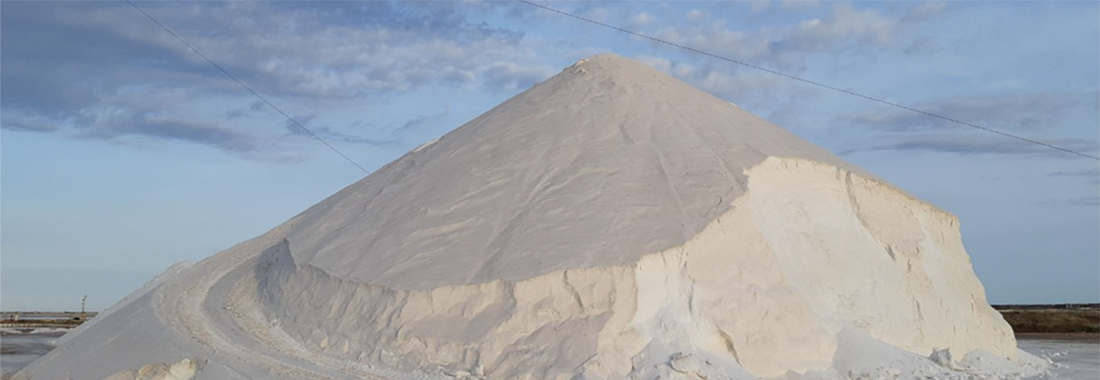Wherever you go, along the 46,000 kilometers of coastline of the 22 countries surrounding the Mediterranean Sea, you will suddenly see a white salt hill appear on the horizon. Homer called it "divine essence", the Romans even made it a currency of exchange. Over the centuries, the salt has inspired cults and religious myths, triggered wars (read the story here). "White gold" has traveled endless navigation routes, connecting banks and ports in the network of relationships that we recognize as the founding heritage of our culture. But above all, the salt pans have preserved the harmony between man and the environment, between well-being and conservation; animal and plant species have adorned the unrepeatable beauty of our landscapes.
Like many other traditional productive activities in the world, the Mediterranean salt pans today suffer from the industrialization of the extraction process, while the hundreds of species that inhabit them are threatened by coastal urbanization. Artisan techniques and materials, local languages and cultures decay and vanish. Thus, the pools of water that are tinged with red in autumn, rare and fragile species such as flamingos, avocets and waders that nest and overwinter in the transition areas of the wetlands.
The MEDSEA Foundation has made the protection and sustainable development of the Mediterranean coasts its reason for existing. This is why we have enthusiastically embraced the EU-Med MedArtSal cooperation project, which will result in the creation of a new commercial paradigm for the benefit of artisanal salt pans. This is already happening through the strengthening of partnerships with those involved in the sectors of sustainable production and tourism, the promotion of collaborations at the corporate, social, environmental level, articulating them in a new governance model.
Within MedArtSal, which involved numerous partners in four different countries, MEDSEA took care of the Italian salt pans. After two years of analysis, planning and dialogue, we have collected the first results (read the projects). The Cervia salinas work to restore and create nests for the large bird population living in its wetlands and, thanks to the purchase of a special oven, the production and sale of a very refined smoked salt.
In Marsala, the funds are used instead to restore the traditional embankments that separate the Ettore & Infersa salt pans from the sea. The engineering techniques are based on a circular economy approach and on ancient construction traditions, in particular the use of local tuff blocks. The project was also able to recover the existing blocks and complete the route with around 10,000 new ones. The embankment section was enlarged with material recovered from the tank cleaning, making the embankment passable by electric vehicles. The restoration of the walkway will become a route accessible to tourists from April to October.
Similar projects have also been developed in Spain, Tunisia and Lebanon. Each according to its history, its needs, its perspectives. All together we met recently in Tunis on 24 and 25 March, for the fair entitled "Towards a sustainable future of our Mediterranean salt pans". Two splendid, very important days of celebration and discussion that served to imagine the next stages of a long journey between the shores of the Mare Nostrum where the white hills of white gold rise, where environment, culture and well-being coexist.

Manuela Puddu
Construction engineer MEDSEA
Latest news

TransformAr Open Day in Marceddì: Marshes and Lagoons to Reimagine the Future
Natural Solutions to Adapt to Climate Change: Lagoons and Marshes. This topic was discussed during an immersive walk between the Marceddì Lagoon and the San Giovanni Marsh on Friday, July…

MEDSEA joined the Natural Heritage Interreg Euro-MED Mission in Rovinj for aligning in projects' Communication
MEDSEA stopped in Rovinj, Croatia, from June 26th to 27th, 2024, to participate in the Communication, Amplification and Policy activities of the Interreg Euro-MED Natural Heritage mission, which brings together the thematic projects…

DesirMED: Nature-Based Solutions for Climate Adaptation, Regional Comparison at the Mid-Year Assembl
The DesirMED project recently held its General Assembly online on June 19 and 20 to review the progress of activities in the first semester. This meeting saw the participation of all scientific partners and…

Waste Hunt at Sella del Diavolo to Protect our Cetaceans Friends
Last Saturday on June 15th, nearly a ton of waste was recovered both on land and at sea during the "Puliamo la Sella!" event in Cagliari. The collected items included…

Active Restoration of Posidonia oceanica: MEDSEA at the 2024 World Seagrass Conference in Naples
MEDSEA continues to lead in the active restoration of Posidonia oceanica, a crucial topic for the conservation of Mediterranean marine ecosystems. Recently, the guide "Guidelines for the Active Restoration of Posidonia oceanica"

TransformAr Open Day on July 5th 2024: Discovering Transformative Solutions for Climate Change at the Marceddì Lagoon
On July 5th, TransformAr presents itself to the public with a special Open Day. The European Horizon 2020 project, aimed at developing transformative solutions for climate change adaptation, invites curious minds and citizens…

Puliamo la Sella! 2024 dedicated to our cetacean friends, with WWF, returns to Cagliari on June 15, 2024
The coastal cleanup organized by the MEDSEA Foundation, Puliamo la Sella!, returns to Cagliari on June 15th 2024. This year's event, now in its sixth edition, will be a special…

Deep Dive: The Talk for World Oceans Day
World Oceans Day provided an opportunity to reaffirm the importance of acting now to protect one of our most precious assets: the marine and coastal ecosystem. The Coalitions of the…
First SEG Meeting of the BLUE4ALL Project: A Focus on Surveillance and Biodiversity Protection
On May 23, 2024, the inaugural SEG (Stakeholder Engagement Group) meeting for the BLUE4ALL Project was held at Casa Todde in Villasimius, with options for remote participation.

RICREA introduces itself in Lucca, working on updating the Contracts, and will also focus on the Blue Crab
River, lagoon, and water body contracts in general are an exceptional tool for sustainable and participative environmental management, essential for the protection of water resources and local biodiversity. However, there…

TransformAr: Climate Adaptation Pathways Finalized for the Fisheries and Agriculture Sector in Terralba
This week, a participatory workshop was held in Terralba as part of the TransformAr project to finalise the adaptation pathways developed with local operators, particularly in the fisheries, agriculture, and biodiversity sectors.

ARTEMIS, Partner Meeting in Marseille to Kick Off Activities
On May 15th and 16th, at the Plan Bleu headquarters in Marseille, the first in-person meeting of the ARTEMIS project was held since the kickoff in March. ARTEMIS is a project within the…

DEEP DIVE: The Alarming State of the Ocean – Inspiring Action and Searching for Solutions (Webinar)
In celebration of World Ocean Day, MEDSEA invites you to the online event "Deep Dive: The Alarming State of the Ocean", a detailed analysis of the challenges that oceans are…

Fire Monitoring Test successfully conducted in Santu Lussurgiu thanks to IoT Technologies
At the end of April, a major breakthrough in fire prevention technology was achieved in the forests of San Leonardo. Thanks to pre-fire detection sensors, an IoT (Internet of Things) technology developed and…

REST COAST, at the annual meeting in Groningen, demonstrates the effectiveness of natural restoration of aquatic systems
The standstill of the Nature Restoration Law, the European law on nature restoration, stalled in its final approval phase in the Council due to the hesitations of some Member States, has…

TransformAr makes a stop in Finland for the sixth Consortium Meeting
In mid-April, the sixth Consortium meeting of the H2020 TransformAr Project was held in Lappeenranta, recognized as the Climate Capital of Finland. This city truly exemplifies sustainability, with 100% of waste recycled and all…
- 1
- 2
- 3
- 4



